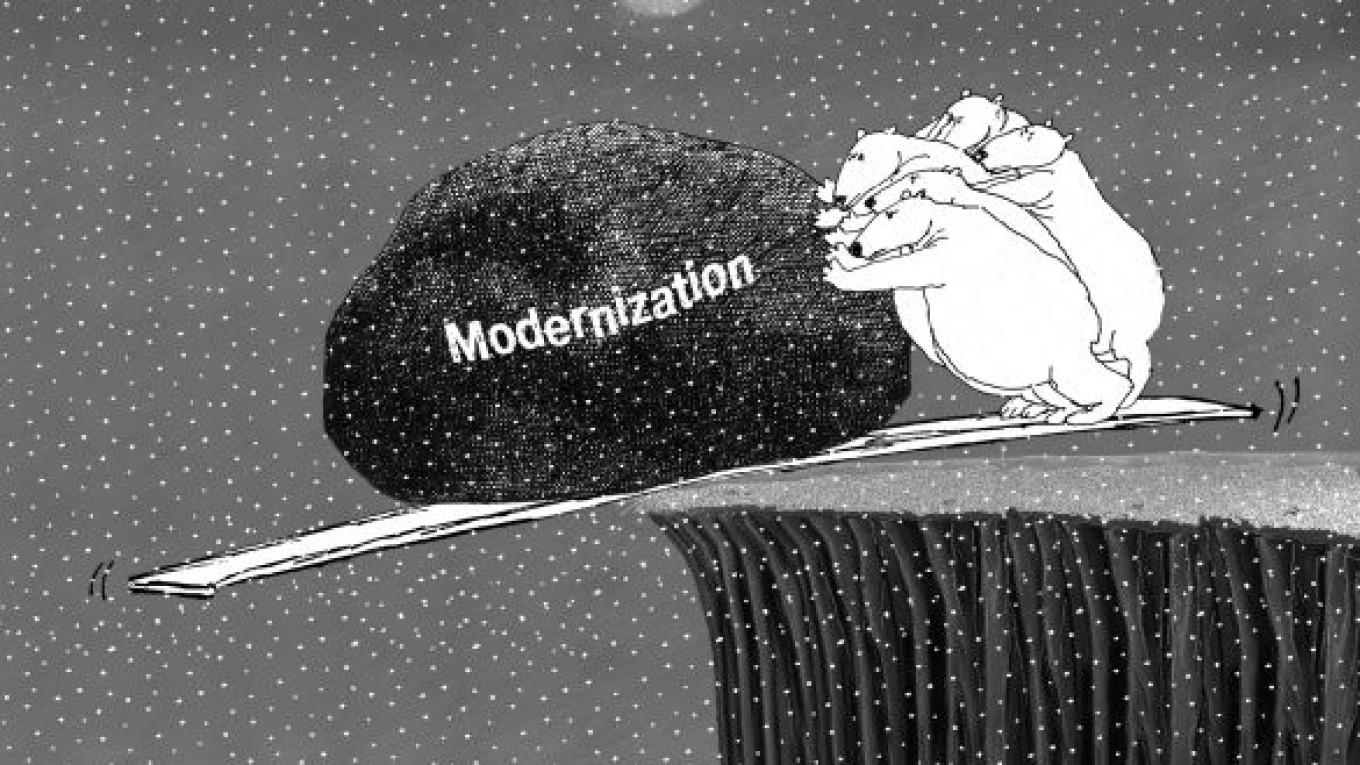Modernization is becoming the new Russian religion. United Russia has already plastered the word on all of its banners. During its short history, United Russia has gone through many different motifs — from “managed democracy” to “sovereign democracy” to the ambitious goals enshrined in “Strategy 2020.” Now we have been introduced to the latest political motif: “conservative modernization.”
In the West, a political party is formed to unite like-minded people in an attempt to gain power or influence. In Russia, however, the party in control, United Russia, modifies itself to appease whomever is in power. But by doing so, it necessarily creates an obstacle to progress.
The “party of power” was able to monopolize the concept of modernization if for no other reason than there are no opposing political forces in the country that are allowed to offer an alternative to United Russia’s conservative modernization — whether it be a “liberal modernization” model or any other alternative conception. As always, monopolization — whether it is political or economic — leads to stagnation.
It is obvious that Russia needs to modernize, and few Russians would argue against the benefit of development per se. But this is where the consensus ends. There is no agreement in society on how exactly Russia should and can modernize, the goal of modernization or its cost. The subject requires a national discussion that is focused on various opinions and strategies. And yet, there is very little discussion in Russia on the best ways to modernized the country.
Modernization is a highly complex process of making the country competitive in the global community. It entails creating an attractive model of national development that could become an example for others to emulate. Real modernization would mean staging a “revolution” of sorts against Russia’s own backwardness. It would involve a real sacrifice that the country must consciously make for the sake of a modern, developed and prosperous Russia in the future. A “modernization revolution” cannot be executed from the top-down through force or tyranny in a Stalin-like manner. If modernization is, in fact, attainable in Russia, it can only be done through individual innovation and initiative.
The primary danger is that in place of true modernization, Russia’s leaders will only slightly tweak existing power-vertical institutions and then try to package it in terms of “modernization reform.”
The defining feature of United Russia is its blind loyalty to the ruling elite in the Kremlin and White House, and this is precisely why the party will not be able to develop an effective modernization program. And when United Russia inevitably fails with its modernization initiative, its position as the country’s pre-eminent political party will be undermined.
Moreover, in proposing the oxymoronic motto of “conservative modernization,” United Russia aligns itself with a host of other conservative political forces, including the Communist Party, religious organizations and many nationalistic and patriotic groups — all of which propagandize a conservative ideology that often embraces revanchism and even chauvinism.
Conservative modernization has succeeded in only two types of countries. First, it has succeeded in countries that have suffered a military defeat or varying degrees of occupation — for example, Japan — or in countries with powerful economic and political allies capable of maintaining stability from outside, ensuring that the modernization process is carried out n. That is, it has worked in countries that lacked full national sovereignty and that, for a certain period, were not striving to obtain it.
Second, conservative modernization has worked in stable countries that were relatively independent of global trends. These are countries that did not necessarily need to modernize their political institutions, strengthen ownership rights or establish the rule of law. These countries had enduring political symbols in the form of monarchies, constitutions or parliaments.
Throughout Russia’s history, however, every attempt to modernize has backfired, and instead of moving forward the country has found itself stuck in a prolonged period of stagnation and degradation. One of the main reasons for this historical trend is that the country’s ruling elite, with the exception of former President Boris Yeltsin, has never been willing to voluntarily step down from power.
Nikolai Zlobin is the director of Russian and Asian programs at the Institute for World Security in Washington. This comment appeared in Vedomosti.
A Message from The Moscow Times:
Dear readers,
We are facing unprecedented challenges. Russia's Prosecutor General's Office has designated The Moscow Times as an "undesirable" organization, criminalizing our work and putting our staff at risk of prosecution. This follows our earlier unjust labeling as a "foreign agent."
These actions are direct attempts to silence independent journalism in Russia. The authorities claim our work "discredits the decisions of the Russian leadership." We see things differently: we strive to provide accurate, unbiased reporting on Russia.
We, the journalists of The Moscow Times, refuse to be silenced. But to continue our work, we need your help.
Your support, no matter how small, makes a world of difference. If you can, please support us monthly starting from just $2. It's quick to set up, and every contribution makes a significant impact.
By supporting The Moscow Times, you're defending open, independent journalism in the face of repression. Thank you for standing with us.
Remind me later.


